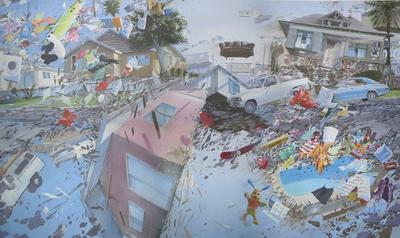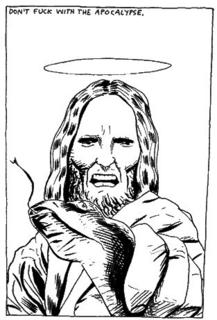
Finally the truth has come out, and now you too can delve into the depths of gibbering madness and horror with this paper craft project. Joy!
Found via Boing Boing

 Peter Blume, "Hadrian's Villa", 1958.
Peter Blume, "Hadrian's Villa", 1958.
Today, a number of corporations and agencies, including British Telecom, IBM, the FBI and even Hallmark, have futurists on staff. (Wired magazine)
"Trend-spotting has, in essence, become just another trend. Consequently, the most successful trend forecasters are repositioning themselves as something more than mere arbiters of taste.[...] For this reason, they no longer answer to the name 'coolhunter'. Some even bristle at the term 'trend forecaster.' Instead, they prefer 'planner', 'researcher' or futurist'. [...] In a way, this desperate need among advertisers to "divine" our intimate truths has indelibly linked consumerism to culture. Now, there's hardly time to discover and explore a new experience or a new approach to living without also considering the new line of products, technologies or services that has been tailored to that discovery. Life is being captured, repackaged and sold back to us as quickly as we live it."(Los Angeles Times)Often I'll complain about how the bubble-economies we set-up only take into account quarter-to-quarter concerns, at the expense of the environment and social justice. However, even the most mundane decisions of persons and organizations carry underlying assumptions about the long-term which go unexamined. There is always an underlying belief in the future. Before the Enlightenment, the predominant idea about time was that things should and would largely stay the same. ('My father was a wainwright, therefore I am one.' etc.) In the unsustainable society that we live in, the only thing we can state about the future with certainty is that it won't look anything like now.
"Kipple is useless objects, like junk mail or match folders after you use the last match or gum wrappers of yesterday's homeopape. When nobody's around, kipple reproduces itself. For instance, if you go to bed leaving any kipple around your apartment, when you wake up the next morning there's twice as much of it. It always gets more and more...No one can win against kipple, except temporarily and maybe in one spot, like in my apartment I've sort of created a stasis between the pressure of kipple and nonkipple, for the time being. But eventually I'll die or go away, and then the kipple will again take over. It's a universal principle operating throughout the universe; the entire universe is moving toward a final state of total, absolute kippleization." -J.R.Isidore explaining the concept of kipple, in Phillip K. Dick's Do Androids Dream of Electric Sheep?In this way, the minutia of our environment threatens its designed rationality, and when this chaos is amplified it undermines not only our operational efficiency, but our rationality of thought. Living in a contemporary American city means learning to live with the fear that suddenly the rules are going to change, by way of catastrophe; that there will be a sudden shift in the terms of our environment, which will likely seem unlikely and irrational until it happens. This kind of moment is illustrated in Adam Cvijanovic's mural, Love Poem (10 Minutes After the End of Gravity). The mural is a rendering of a worm's eye view of a mass of deterius thrown aloft. Cvijanovic is as much of a collagist as a painter. I saw a video taped lecture he gave to the Tyler grads about depicting suburbia, more than a year ago, and much of what he talked about was piecing together images from lots of different places, and making it coherent in one perspectival projection. One implicit point was that suburbs have a completely different relationship to their details and junk: They tend to hide their refuse and eccentricities more, at the expense of a suffocating sameness.
 Adam Cvijanovic, Study for 10 Minutes after Gravity Fails L.A., 2005, Flashe and house paint on Tyvek. Link to source.
Adam Cvijanovic, Study for 10 Minutes after Gravity Fails L.A., 2005, Flashe and house paint on Tyvek. Link to source."His repertory of atomic explosions, hippies, vixens, cowboys, dismembered bodies, old cars and liquor bottles describes a morning-after portrait of America in extremis. The affect is world-weary but slyly comic... [I]f he often repeats himself now, you could say he has an eye for monotony and abundance, an American trait."


 I just got back from the Theater of the Living Arts in Philadelphia where I saw the band Gogol Bordello. I'd read about the band in the New York Times, but hadn't gotten a chance to hear them; Some New Orleans refugee friends of mine took me to the show. The music sounded much like the Pogues, in that it drew strongly from traditional music of a specific area, in this case the Ukraine. The band had many members which filled the stage, including two older men who played violin and accordion, and two Asian girls who did synchronized dances, acted as majorettes, and threw props into the crowd. From the very first moments of their set, it was obvious that the band was as enthusiastic about their music as they wanted the audience to be, and this gung-ho attitude cleanly dispensed with the pretension that seems to weigh down other bands.
I just got back from the Theater of the Living Arts in Philadelphia where I saw the band Gogol Bordello. I'd read about the band in the New York Times, but hadn't gotten a chance to hear them; Some New Orleans refugee friends of mine took me to the show. The music sounded much like the Pogues, in that it drew strongly from traditional music of a specific area, in this case the Ukraine. The band had many members which filled the stage, including two older men who played violin and accordion, and two Asian girls who did synchronized dances, acted as majorettes, and threw props into the crowd. From the very first moments of their set, it was obvious that the band was as enthusiastic about their music as they wanted the audience to be, and this gung-ho attitude cleanly dispensed with the pretension that seems to weigh down other bands.